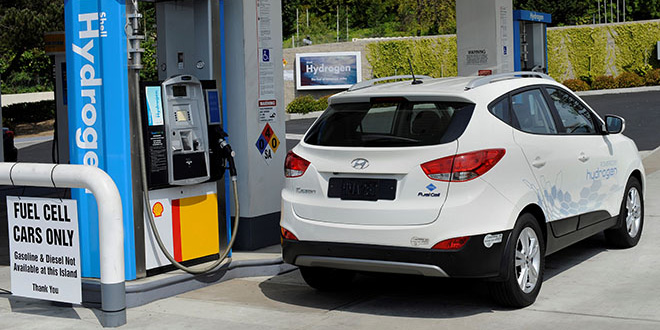Fuel cell vehicles – love ‘em or hate ‘em, they’re here. The Toyota Mirai made its debut at the recent Los Angeles Auto Show, and is scheduled to go on sale next year. The 2015 Hyundai Tucson Fuel Cell has been available for lease since June. Honda plans to launch its hydrogen offering within two years.
Our colleague John Voelcker of Green Car Reports recently summed up the side of the fuel cell vehicle (FCV) skeptics, publishing a list of questions for execs at Hyundai, Toyota, and Honda. To their credit, all three carmakers responded, and so did the California Fuel Cell Partnership (Part 1, Part 2).
Their voluminous answers (Hyundai alone submitted six single-spaced pages, with numerous notes) probably won’t change many minds, and, as with any new technology, some of the most important questions won’t be answered until FCVs have been on the market for a few years. However, it’s interesting that the automakers do seem to care what the “EV press” thinks. And it’s obvious that there’s a lot of interest in this new technology (GCR’s series of articles has already generated well over 1,000 reader comments).
Much of the material was devoted to reiterating the drawbacks of current EVs (limited range, long charging times), which battery boosters believe will gradually go away, eliminating FCVs’ advantages. The fuel cell makers aren’t having any of this. “We can all speculate about future potential product innovations, like advanced battery technologies, but at this point they are just that: speculation,” said Hyundai.
The automakers touted the advantages of fuel cells in larger vehicles, noting that half of all new vehicles sold in the US are pickups, SUVs and such. “To scale up in vehicle size, there are exponentially diminishing returns to adding battery, as the added weight requires added structural reinforcements and decreases vehicle efficiency,” said Toyota.
In response to Voelcker’s question about what companies see a profitable business in building hydrogen stations, the California Fuel Cell Partnership said, “Most current stations are developed by industrial gas companies, including Air Products, Air Liquide, and Linde. New companies such as Hydrogen Frontier, First Element Fuel, and Stratos Fuel see a future in [selling hydrogen]. The first 100 stations in California are co-funded by the state through a competitive grant process. We’re starting to see some lower costs in the grant requests, particularly with 100-percent renewable stations.”
One of Voelcker’s questions pointed out that hydrogen is generally considered a less efficient energy storage medium than batteries. However, this issue can get very complex when you consider how the electricity or hydrogen is generated, and advocates on opposing sides tend to refer to different sets of figures. More to the point, while efficiency is of great importance to engineers, it’s probably not on the radar of most car buyers. Hyundai conceded that, “It is generally understood that battery-electric vehicles are a more efficient pathway for electricity utilization in transportation,” but added that very few consumers buy solely on energy efficiency considerations if the most efficient vehicle doesn’t meet their needs.
Source: Green Car Reports



















































































